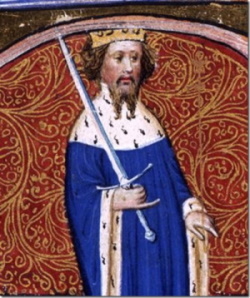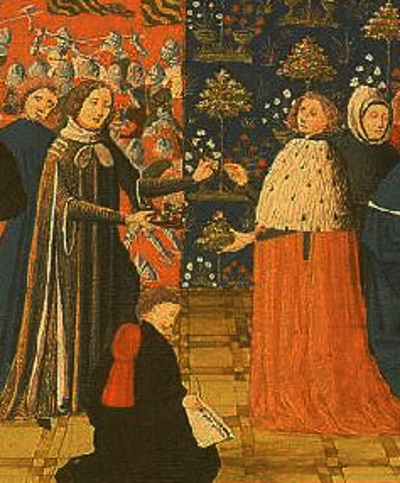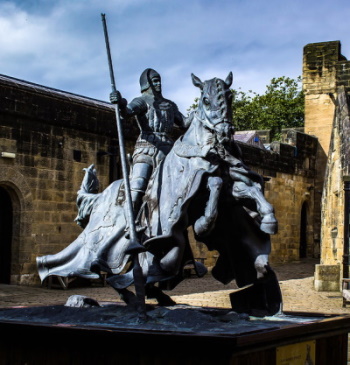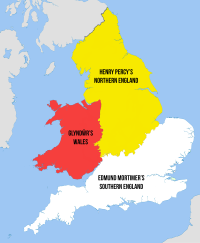Sir Edmund Mortimer (d1409)
Would-be Ruler of Southern England
The Wars of the Roses between the houses of York and Lancaster are usually said to have begun in 1455 when Richard, 3rd Duke of York, defeated and captured King Henry VI at the 1st Battle of St Albans. But the seeds of civil war can be seen at least 80 years earlier, in the friction between Edmund Mortimer, 3rd Earl of March, and John of Gaunt, 1st Duke of Lancaster. Later, the unilateral seizure of the crown in 1399 by Henry Bolingbroke, the 2nd Duke of Lancaster, polarised the country. The unpopularity of his reign as Henry IV caused many to support an alternative, Mortimer, claim to the throne. So, for first 25 years of the 15th century the Lancastrian kings had to be always on their guard against the Mortimer threat. Strangely, the one Mortimer who doesn’t seem to have been too enthusiastic about a Mortimer take-over was Edmund the 5th and last Mortimer Earl of March.
Edmund is a name that occurs repeatedly in the history of the Mortimers of Wigmore so it’s important to distinguish clearly between them. The later Mortimer Earls of March were:
- Edmund Mortimer, 3rd Earl of March, mentioned above;
- Sir Edmund Mortimer, younger brother of Roger Mortimer, 4th Earl of March, who is the subject of the this article;
- Edmund Mortimer, 5th Earl of March who is the subject of the next article.

King Henry IV

Richard II reliquishes
the crown to Henry IV
Sir Edmund Mortimer, the younger brother of Roger, 4th Earl of March, was born in Ludlow in 1376. His father died soon after his 5th birthday but left him well provided for. He was very close to his older brother, who subsequently granted him various estates, so he was very wealthy, for a younger son. In 1397 he served as his brother’s lieutenant in Ireland but, his brother dying the following year and his uncle Thomas the year after, he soon became the only surviving adult male Mortimer of Wigmore.
In 1399, Henry Bolingbroke was in exile on the Continent when his father, John of Gaunt, died. Richard II then made a fatal mistake: he seized Bolingbroke’s estates and denied him his inheritance. With little to lose, the new Duke of Lancaster now returned to England. The king was away in Ireland and Lancaster met no opposition as people were horrified by the actions of the king and sympathetic to Lancaster’s situation. Sir Edmund Mortimer could see the way things were going and swore allegiance to him in Hereford. Later in the same year Richard II was deposed and Lancaster was crowned as Henry IV.
Also supporting Henry of Lancaster against Richard II had been the Percys: Henry Percy, Earl of Northumberland and his son Sir Henry Percy, nicknamed Hotspur. Although Hotspur was 12 years older than Edmund Mortimer, a strong bond developed between them. Hotspur served in Ireland with Edmund’s brother Roger, the 4th Earl of March, and he was married to their older sister Elizabeth. In 1400, Owain Glyndwr declared himself Prince of Wales and rebelled against English rule. Many of the native Welsh actively supported him, and he rapidly took control of extensive areas of northern and central Wales. Hotspur was already High Sheriff of Flint but, in March 1402 he was appointed the king’s Royal Lieutenant in North Wales, charged with defeating Glyndwr and restoring English rule.
When Owain Glyndwr started to threaten Mortimer estates in Central Wales, Sir Edmund Mortimer raised a strong force from among the men of Herefordshire and Maelienydd and moved against him. On 22nd June 1402 the two armies met at Bryn Glas, Pilleth, just to the west of Knighton and Presteigne. The English army was heavily defeated and Sir Edmund Mortimer was captured.

The Welsh were in a strong position on top of Bryn Glas, the hill on the right

Statue of Hotspur at Alnwick
Given the scale of the defeat, there has been speculation that Mortimer’s Welsh soldiers may have changed sides, and Sir Edmund’s personal commitment to the battle was seriously questioned in the light of future events. He was taken to Glyndwr’s homeland in Snowdonia where he was treated well. Cynical about Mortimer’s loyalty, Henry IV forbad the Percys from ransoming him and, in October of the same year, he started to seize his lands and give them to others.
Any remaining loyalty Edmund might have had then disappeared completely and he threw in his lot with Glyndwr. In November, he married Owain’s daughter Catherine, and in December he was back in Maelienydd. There he publicly announced that he had joined Glyndwr and that their objective was to restore Richard II, if still alive, or to confer the throne on Sir Edmund’s nephew, Edmund, 5th Earl of March.
Increasingly disillusioned with Henry IV, in the following year the Percys joined Glyndwr and Mortimer in open rebellion. In July 1403 Hotspur met Henry IV in battle at Shrewsbury. Despite the non-arrival of Hotspur’s father, with his forces, the battle was evenly fought until Hotspur was killed by an arrow, when the tide turned. The king was eventually victorious, though his army sustained heavy losses.
This was not the end of the rebels’ activities, however. In February 1405, Owain Glyndwr, Henry Percy, Earl of Northumberland and Sir Edmund Mortimer signed a Tripartite Indenture which carved up England and Wales into three parts: Glyndwr was to have complete overlordship of Wales, Percy was to control all of northern England and some counties in central and eastern England, while Sir Edmund Mortimer was to have the rest of southern England. But it was not to be: when Northumberland took up arms again in May 1405, this second rebellion was to prove as unsuccessful as the first.

The Tripartite Indenture
Sir Edmund Mortimer now dropped into the background, and the situation returned once again to Glyndwr and the Welsh against the English king. From 1406 onwards, Henry IV gradually regained more and more control of Wales and Glyndwr’s cause declined. This was a bad time for Sir Edmund Mortimer. He was in Harlech castle during the eight-month siege by Henry IV’s son, Henry, Prince of Wales and died there in some distress in late 1408 or 1409.